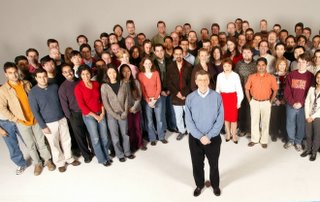
The Bill Gates nobody knows
Harun ur Rashid*
Bill Gates -- Microsoft Chairman and Chief Architect -- during his short visit to Bangladesh on Monday, December 5, announced that Microsoft will train over 10,000 teachers and 200,000 students in information technology in Bangladesh in the next three years, and he has already donated $100,000 to this end. He and his wife Melinda Gates were on their first visit to Bangladesh as part of their weeklong visit to the region.
Bill Gates set up Microsoft in 1975 and since then both Microsoft and Bill Gates became astonishingly wealthy. He is the richest person in the world according to Forbes magazine and has about $56 billion. He is the owner of Microsoft that has captured 94 per cent of software business in personal computers sold around the globe. Microsoft has market capitalisation of $227 billion (nearly five times the GDP of Bangladesh).
In the league of philanthropists
Very few know of Bill Gates' humanitarian side. He is the biggest philanthropist in the world. He and his wife Melinda established a foundation that donates money to many research organisations in the developing world.
The Bill & Melinda Gates Foundation has an endowment of $28.8 billion. By comparison, the Ford Foundation -- the next biggest -- has assets of about $10 billion. Since 2000, the Gates Foundation has donated $7.5 billion.
Bill Gates joins other philanthropists such as Andrew Carnegie, John D. Rockefeller, Henry Ford, and Ted Turner.
Andrew Carnegie (born in Scotland and settled in America) was the 19th and 20th century steel tycoon. He gave away, during his time, $500 million (more than $10 billion in today's money) and was particularly interested in libraries, adult education, and research on peace. "A man who dies rich dies disgraced. You can't take it with you," he once said.
The oil tycoon John D. Rockefeller was such a great philanthropist that he gave away about $900 million. He established the University of Chicago, Rockefeller University in New York, and the Rockefeller Foundation.
The auto industry tycoon Henry Ford founded the Ford Foundation. His great-grandson donated $10 million this year to the Vedic Planetarium in India for the Society of Krishna Consciousness.
Ted Turner, the founder of CNN, pledged $1 billion in five years to the UN. He has now turned his attention towards the environment.
Donations by Bill Gates
The Gates Foundation spends most money in the developing world, especially in Africa, fighting diseases, such as Aids, tuberculosis, and malaria. In July this year, Gates gave $450 million for funding research projects such as childhood vaccines that do not require refrigeration, needles, or multiple doses, and finding new ways of preventing insects transmitting malaria that infects 500 million people each year.
In October this year, the Gates Foundation gave a further $258 million to fight malaria, making this grant equivalent to more than three-quarters of the total global spending on research into the disease. In essence he has been funding into areas that big pharmaceutical companies should do.
In America, he pours money into Internet access for libraries and an education programme that has funded about 750 new high schools, as well as a similar number of existing schools.
Despite being one of the biggest believers in capitalism, Gates does not believe that answer to every problem is the market. "One thing that it does not work well on is if you have diseases that only exist in countries that are very poor," he said.
Gates has spoken often about inequality and lack of opportunity, which underline both his health and education initiatives.
It has been reported that Gates donated $1 million to Brac a few years ago, and with that money Brac has established the School of Public Health within the Brac University. It awards MPH (Masters of Public Health) degrees to students, both foreign and Bangladeshi nationals. Students who are eligible for admission get full scholarship.
Why do some rich men give away money?
Individuals ordinarily become successful and rich through cut-throat competition. They are determined to ensure their competitors do not have a chance against them. Such people are driven by sheer motivation of getting rich and making millions.
Again, these very people who are able to take harsh decisions in relation to their business interests, have a softer side towards humanity. Andrew Carnegie once said, "It is the mind that makes the body rich. There is no class so pitiably wretched as that which possesses money and nothing else."
Others have said that it is the social conscience that pricks them when they see so much disparity between rich and poor. Bill Gates once said, "I decided at a very early stage that whatever wealth I had I would want to give back to society."
There are fewer prominent humanitarians than there once were. Certainly, there are far fewer philanthropists on the grand scale, not because there is less money or need but because the world has changed, people have become individualist and greedy.
There is a saying that you do not judge a book by its cover, so do not judge a person by the public face that the media publishes. A humanitarian or philanthropist is one who is devoted to promoting human welfare. Bill Gates certainly comes within that definition.
>> Barrister Harun ur Rashid is a former Bangladesh Ambassador to the UN, Geneva.
2 comments:
Hey Khorshed--You've got a great blog going. It's nice to see smart Bangladeshi people writing online!
Malina
hello, awesome work....nice to see something like this..\Mack\Toronto
Post a Comment